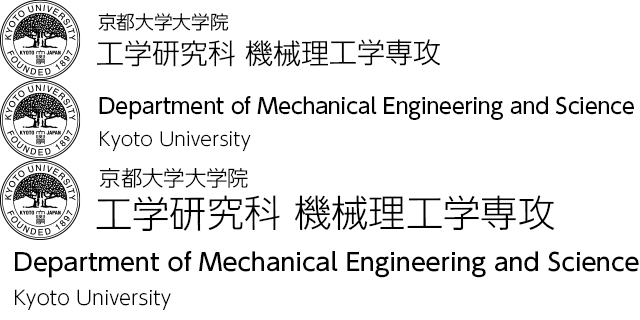Outline
Mechanical Engineering Group
Mechanical engineering is a comprehensive discipline concerned with monozukuri (literally, "making things"), which serves as the foundation to support the development of a wide range of industrial fields.
The history of mechanical engineering studies at Kyoto University spans more than a century, dating back to a school of mechanical engineering established when the university was founded in 1897 as the Kyoto Imperial University. Through research and education that has constantly anticipated the evolution of society, the Department of Mechanical Engineering at Kyoto University has been at the center of engineering in Japan. In 2003, the department was designated a "Center of Excellence for Research and Education on Complex Functional Mechanical Systems," under the 21st Century COE Program of the Ministry of Education, Culture, Sports, Science and Technology, and we are promoting world-leading research through this project.
In 2005, to respond comprehensively to the new demands of the era, the Departments of Mechanical Engineering, Engineering Phisics and Mechanics, Precision Mechanics and Aeronautics and Astronautics were integrated to form the Mechanical Engineering Group. This initiative was aimed at establishing an enhanced system of research and education.
The Department of Mechanical Engineering, which serves as the core of the Mechanical Engineering Group, implements research and education to provide a foundation for mechanical engineering, grounded in the physical sciences, with the aim of promoting future advances in engineering and technology. As a center for the promotion of new project-based research and education initiatives adapted to the demands of a changing world, the Mechanical Engineering Group includes the Departments of Micro Engineering and Aeronautics and Astronautics as part of an innovative system for meeting today's challenges in a flexible and focused way.
Department of Mechanical Engineering and Science
Long ago, when humans began to walk upright, they carried tools in their hands. Tools served as extensions (instruments) of the human hand. Over time, tools evolved, and even functioned separately from the human hand. At this stage, they came to be known as machines. Machines thus act as extensions of the human body, created to realize the functions that humans require. However, the functions required by humans today are very different from those required 10 years ago, and the machines that deliver these functions have also changed. While the powerful turbines of power plants that produce electric power on a massive scale or the linear motor cars that travel at 500 km/h are still clearly recognizable as machines, new technologies such as fuel cell systems and functional nanostructures, which do not exhibit any visible motion, as well as new concepts like intelligent soft systems, can also be regarded as extensions of the human body—despite the fact that they do not appear as machines in the traditional sense. "Mechanical engineering" is activity that is continually broadening the horizons of "machines".
Mechanical engineering is the study of physical systems, from the microscopic to the macroscopic, for the purpose of developing and advancing technologies to benefit humans in areas relating to production processes, energy, the environment, lifestyles, life, living organisms, and medicine. The disciplines that serve as its foundation include the mechanics of materials, heat and fluids, as well as solid-state physics, mechanical dynamics, vibration engineering, and control engineering. Furthermore, this foundation requires the application of engineering concepts relating to the design, manufacture, evaluation, diagnosis and control of mechanical systems and their component elements.
The Department of Mechanical Engineering and Science pursues broad-ranging research and education on themes aimed at cultivating insight and knowledge in all of these disciplines, for the purpose of promoting a harmonious coexistence between humans and nature. It also strives to train technologists and researchers equipped with the skills to define and develop solutions to challenging problems, leadership abilities, and the ablity to respond flexibly to the demands and expectations of society, industry, and academia.
The Department of Mechanical Engineering and Science comprises six basic chairs— Design Systems Engineering, Manufacturing Systems Engineering, Material Mechanics, Fluids Engineering and Science, Material Engineering, and Mechanical Dynamics—as well as two cooperating chairs, Bioengineering and Radiation Material Science. Organically linking these 18 fields, the department pursues fundamental and leading-edge research and education.
